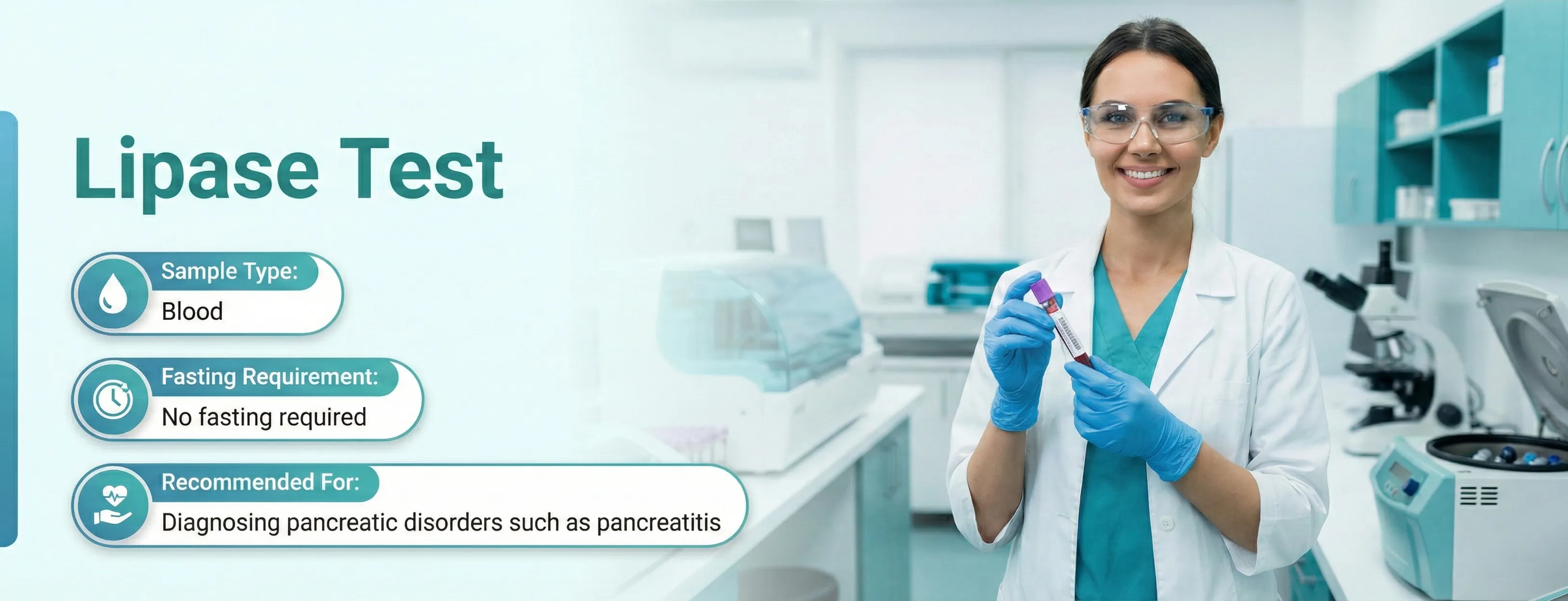403+ orders placed in your location
100% NABL & ISO Certified Lab • 100% Accurate Reports
Lipase Test
Serum lipase Test, LPS, Total lipase test
- SummaryThe Lipase test measures the level of lipase, an enzyme produced by the pancreas that helps digest fats. It is primarily used to help diagnose pancreatitis and other pancreatic disorders. The test is performed using a blood sample, and fasting for 8–10 hours is usually recommended for accurate results.Read more
- Reports Within13 HrsView Sample Report100% NABL & ISO Certified Labs
- SampleBlood
- AgeAll Age Group
- GenderMale and Female
- FastingNot Required
PharmEasy Promises
Know More About The Test
A quick info on Lipase Test
Overview
Lipase is a protein enzyme mainly produced by the pancreas. It secretes it into the pancreatic duct, from where it flows into the duodenal part of the small intestine. Additionally, small quantities of lipase are also produced by the salivary gland, the intestine, the stomach and the liver. It helps in the breakdown and completes digestion of triglycerides (complex fats) into simple fatty acids for easy absorption into the intestines.
A lipase blood test measures the amount of lipase in the blood. Cystic fibrosis, Crohn's disease or celiac disease prevents the body from producing enough lipase that interferes with fat digestion and absorption. Furthermore, when the pancreas is affected by inflammation or infection, the body produces excess lipase.
A lipase blood test can determine a disease or damage to the pancreas by measuring the amount of lipase in the body. Although a small amount of lipase in the blood is normal, an increase or decrease in blood lipase levels could indicate a disorder of the pancreas.
Having symptoms like abdominal pain, loss of appetite, fever, nausea, vomiting, back pain, diarrhoea and unexplained weight loss shows an abnormality in lipase level in the blood. Your doctor prescribes a blood lipase test for diagnosis and monitoring of disorders related to the pancreas and associated conditions.
Blood lipase levels can rise due to its increased secretion into the blood because of cell injury in the pancreas. A high level of blood lipase is commonly seen in acute pancreatitis, chronic pancreatitis, pancreatic cancer, gallstones and pancreatic duct obstruction.
Lipase concentrations usually rise within 3 to 6 hours of an acute pancreatic attack and will gain peak elevation in 24 hours and remain elevated for up to 8 to 14 days. This elevation of lipase in the blood gives insight to the doctor to start an effective treatment timely. A higher level of lipase in the blood for a longer period may have adverse medical implications.
Lipase test high values give your doctor an idea of the severity of the pancreatic inflammation so that your doctor can begin an effective treatment.
Sample Type
A fasting blood sample requires investigating the lipase level present in the blood. For at least 8 to 12 hours before taking the blood sample, you will not be allowed to eat or drink anything other than water.
Risk Assessment
Acute/chronic pancreatitis, kidney disease, peptic ulcers
What does this test detect?
A lipase blood test measures the levels of lipase in the blood.
Some medications that may affect the levels of lipase include:
- Birth control pills
- Morphine
- Thiazide diuretics
Here are some disease conditions that show a variation in the lipase level in the blood:
- Diabetes
- Gall Stones
- Obesity
- High triglycerides
- Peritonitis
- Pancreatic cyst
- Crohn's disease
- Celiac disease
Indications for Lipase Test
When there is severe abdominal pain, vomiting, nausea, or a sign of acute pancreatitis, a physician may recommend a lipase blood test.
Abnormal lipase level in the blood causes symptoms like:
- Vomiting and nausea
- Diarrhoea
- Severe or mild abdominal pain
- Severe back pain
- Loss of appetite
- Increased heart rate
- Fever
- Obesity
So if you are suffering from the above symptoms and diseases, you should check your lipase level in the blood.
A Lipase blood test can help your doctor monitor as well as decide the dose of your medications.
How frequently should you take this test?
When abnormal levels of lipase are detected in your blood, your consultant doctor may suggest repeating the lipase test at least every three months. It can help in further treatment of any abnormalities or problems.
If any abnormal results are not found in the previous Lipase test, you can repeat the test on an annual basis.
Test Preparation
What to Expect During the Test
Before the Test
Before undergoing the lipase blood test, it is important to fast for A to B hours beforehand. This fasting period is crucial for achieving accurate test results. Therefore, it is wise to seek advice from a doctor before taking any test to determine if there are any specific restrictions in place.
During the Test
A phlebotomist will draw blood from a vein in your arm for the sample. Your experience will likely involve:
- Disinfecting the site where the needle will be inserted with an antiseptic.
- Wrapping a tourniquet around your arm to make the veins more visible.
- Inserting a disposable needle into the vein to collect the blood. This process may cause minor discomfort from the needle and could take a few seconds.
- Placing the sample in a small container or test tube labelled with your test information.
After the Test
After the Blood is Collected:
- Applying a bandage to the site where the needle was inserted to prevent any bleeding.
- You may feel slightly sore or lightheaded, which is normal and nothing to be concerned about. You may be advised to rest for a few minutes.
- Contact your doctor if you experience any bleeding, discomfort, or rashes at the puncture site.
Parameters
The lipase test measures the level of lipase in the blood. It helps in the metabolism and absorption of triglycerides (fats) in the body.
Lipase test values provide insights into either a decrease in lipase levels or an increase in lipase. It indicates a disorder related to the pancreas like chronic pancreatitis, acute pancreatitis, etc.
Ranges
The normal ranges of lipase can be different with the age, sex, method of testing and health history of the patient.
A lipase blood test is measured in the presence of units per litre of blood.
Normal ranges are usually between 23-300 U/L
Although, the normal value range may vary slightly between different laboratories as laboratories use distinct methods for the measurements.
The lipase test shows individual differences in testing, so it is important to discuss the results with a doctor, as the same result may indicate a problem with one but not in another.
The normal values and reference ranges of the test may vary from lab to lab. Please refer to the ranges mentioned in the report and consult a doctor to understand the interpretation of lab reports.
Test Result Interpretation
The higher and lower levels of lipase in the blood cause mild to severe health problems.
High level of lipase
- Acute and Chronic Pancreatitis: A medical condition that occurs in the pancreas in which inflammation of the pancreas happens. It may start suddenly and last for several years.
- Pancreatic tumours: The formation of cancer in the pancreas is known as pancreatic tumours. Excess lipase levels can cause pancreatic tumours because of the deposit of lipase protein in the pancreas.
- Kidney disease: High level of blood lipase can lead to mild to severe kidney diseases like chronic kidney disease, kidney stones and inflammation in the kidneys.
- Peptic ulcers: When lipase levels in the blood increase, some ulcers or sores usually develop deep inside the stomach or intestines. This condition is termed peptic ulcers.
- Blockage of pancreatic duct: Excess amount of blood lipase tends to block the pancreatic duct (transportation duct).
Low levels of lipase
Lipase low levels are due to damage to the cells of the pancreas that form lipase. This happens because of some chronic medical conditions.
- Cystic Fibrosis: A severe medical health condition that damages the lungs and digestive system. It affects the cells which produce mucus, sweat and digestive juices.
- Fat Malabsorption: As the main function of lipase is metabolism and absorption of fat. When the lipase amount is too low, the body does not absorb fats completely.
Risks and Limitations
The Lipase blood test is a commonly done blood test with rare risks of complications. See your doctor if you notice:
- Persistent bleeding at the site of needle-insertion.
- The skin where the needle went in becomes red, swollen, or hurts.
Limitations of the test
- The accuracy of the test could be affected due to equipment or human mistakes.
- Misinterpretation of the markers leading to inaccurate reports.
Was This Test Information Helpful?
Please rate your experience
References
Health packages containing 'Lipase Test'
People Also Ask
What does it mean when your lipase is high?
What foods are high in lipase?
How do I get my lipase levels down?
Can stress elevate lipase?
What is an abnormal lipase level?
Popular Tests
Have any doubts? Ask us.
Ask us anything about the Lipase Test to understand it better
Explore More at PharmEasy
Top-Selling Healthcare Products
We provide trusted, expert-curated health content to support better awareness,prevention, and care.
Backed by experienced doctors, medical experts, and strict editorial standards.

